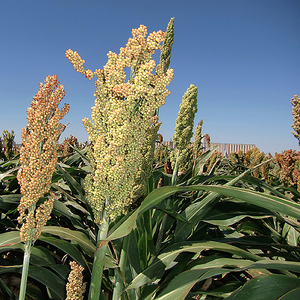Sorghum Checkoff announces $500,000 investment




USDA Agricultural Research Service
June 8, 2016
BY Sorghum Checkoff
The Sorghum Checkoff recently announced a $500,000 investment in sorghum research, made at the inaugural Transportation Energy Resources from Renewable Agriculture (TERRA) program field day at the University of Arizona's Maricopa Agricultural Center in Maricopa, Arizona.
This investment follows the U.S. Department of Energy's commitment of $30 million in 2015 for sorghum to be researched as a model feedstock through the TERRA program. Six projects were funded under the program and will bring new technology to sorghum breeders.
"This half a million dollar investment represents the commitment of U.S. sorghum farmers to this initiative," said Tim Lust, Sorghum Checkoff CEO. "Though this funding stands independently from DOE, it will build on three of the TERRA projects."
Advertisement
Advertisement
The TERRA program will integrate biology, engineering and computer science into technological innovations that will facilitate advancements in agricultural productivity, crop yields, environmental stewardship and energy security.
These technologies were showcased at the field day, including the “Field Scanalyzer” located at the Maricopa Agriculture Center, which is currently the largest field crop analytics platform in the world. It incorporates state-of-the-art remote sensing technologies that measure and analyze crop growth and development with unprecedented resolution, speed and accuracy.
Advertisement
Advertisement
"The goal of this program is to integrate high throughput phenotyping by developing cutting-edge remote sensing platforms, which will transform crop breeding and advance biofuel production," said John Duff, Sorghum Checkoff renewables director. "Improved biofuel crops could lead to increased production of domestic fuels, reducing dependence of foreign sources of transportation fuels."
The Sorghum Checkoff board of directors is committed to funding projects that will support increases in field-level productivity as well as market-level demand and value enhancements, which continue to be seen as a valuable means of increasing opportunities for farmer profitability. The funding of these projects is contingent upon approval from USDA Agricultural Marketing Service.
Related Stories
The U.S. Department of Energy Bioenergy Technologies Office (BETO) announced up to $23 million in funding to support research and development (R&D) of domestic chemicals and fuels from biomass and waste resources.
The U.S. DOE has announced its intent to issue funding to support high-impact research and development (R&D) projects in two priority areas: sustainable propane and renewable chemicals and algal system cultivation and preprocessing.
Sens. Sherrod Brown, D-Ohio, and Pete Ricketts, R-Neb., in August introduced the Renewable Chemicals Act, a bill that aims to create a tax credit to support the production of biobased chemicals.
The Chemical Catalysis for Bioenergy Consortium, a consortium of the U.S. DOE’s Bioenergy Technologies Office, has launched an effort that aims to gather community input on the development of new biomass processing facilities.
USDA on March 8 celebrated the second annual National Biobased Products Day, a celebration to raise public awareness of biobased products, their benefits and their contributions to the U.S. economy and rural communities.
Upcoming Events










